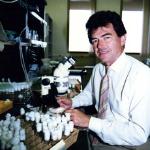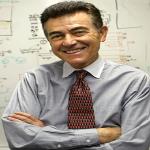05 April 2010

Photo: Mark Finkenstaedt
Francisco Ayala accepts the 2010 Templeton Prize for his achievement in affirming life's spirituality.
Francisco Ayala is a man at the intersection of science and religion, who sees no conflict between the two. The molecular biologist has revolutionized evolutionary theory, leading to new ways to prevent diseases while shedding light on issues concerning society, ethics and religion.
Francisco Ayala was born in Madrid in 1934, a few years before the Spanish Civil War that deeply divided his native country and prompted an exodus of the Spanish elite. But Ayala's family - who owned a department store - stayed and he grew up in the shadow of the Spanish dictatorship. He and his siblings went to Catholic schools.

UC, Irvine
Francisco Ayala, professor of biology and evolutionary genetics, in his laboratory at the University of California (1988)Science and Religion
A priest sparked Ayala's interest in science. He went on to study physics at the University of Madrid and with that degree in hand headed to a theological center in Salamanca, where, in 1960, he was ordained a Dominican priest.
But the next year he decided to return to science and five years later, left the priesthood. He pursued a degree in evolutionary genetics at Columbia University in New York. "Trying to understand humans, what we are and where we come from," he says.
In 1964, Ayala received a doctorate in the field. His research began with fruit flies, but over the last two decades, his focus has been on parasitic protozoa, single-celled organisms that cause major diseases.

UC Irvine
Francisco Ayala with sons, Carlos [left] and Jose [right], in 1995.Scientific breakthrough
Ayala discovered that parasites were responsible for Chagas, an often fatal disease afflicting millions of people in the Americas. The parasites reproduced not sexually, but by cloning.
"Each individual [parasite] grows and divides into two, and that process keeps going on generation after generation, thousand after thousand years, millions after million years," says Ayala.
This led Ayala to similar discoveries about the parasites that cause malaria and other tropical diseases. "We are able to demonstrate that the spread of malignant malaria happened only within the last five thousand years, even though the parasite affects hundreds of millions of people. So it's a very recent human disease in the evolutionary scale."

UC Irvine
Francisco Ayala argues both science and faith are damaged when one invades the other.Ayala says malaria was likely first transmitted from chimpanzees to humans through a single mosquito. In one recent study - among the 1,000 he's published - Ayala establishes that gorillas and chimps may serve as reservoirs for the parasites that cause human malaria. "The next stop is for epidemiologists and physicians who are trying to develop vaccines or drugs to take advantage of this knowledge in doing their work," he says.
'The bible has no place in science education'
In addition to his work as a scientist, Ayala has also written and lectured extensively on religion and science. The former priest says the theory of evolution is consistent with his Christian faith. "Belief in God and accepting that life has purpose and meaning and accepting that life has moral values and other things that are properly the content of religion are perfectly compatible with science."
Poland-Darwin's-Gift-230.jpg)
UC Irvine
Francisco Ayala travels to Poland for a book signing following the publication of his book, 'Darwin's Gift to Science and Religion.'In 1981 Ayala joined a legal battle as an expert witness in the challenge against an Arkansas law mandating that the biblical story of creation be taught in schools, alongside Darwin's theory of evolution. "That law was rejected," in court he says because, "the bible has no place in science education."
That position was later affirmed by the U.S. Supreme Court. "Laws like this which required teaching creationism in science classes are unconstitutional," he says.
Not only are the laws unconstitutional, Ayala asserts, but creationism - especially widespread in the American South among evangelical Christians - is contrary to Christian tradition. He says 3rd century church theologian and philosopher St. Augustine understood that.
"Augustine says repeatedly what the bible is teaching us is how to worship god, how we should relate to each other, our moral values and how to go to heaven, not how the heavens were made. How the heavens were made is for the scientists to find out."
Ayala became a naturalized U.S. citizen in 1971. He has received many awards for his work, including the National Medal of Science, the nation's top science honor. And, this year he won the Templeton Prize for achievement affirming life's spirituality. In announcing the award, Templeton officials said "Ayala's clear voice in matters of science and faith echoes the foundation's belief that evolution of the mind and truly open-minded inquiry can lead to real spiritual progress in the world." The prize is worth $1.6 million and Ayala says all the money will go to charity.